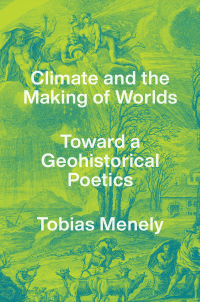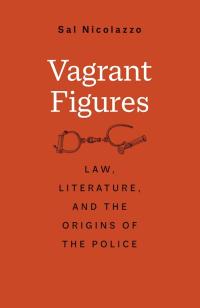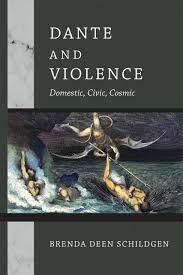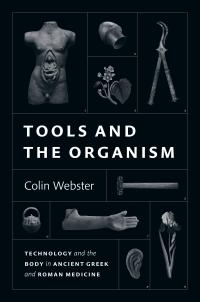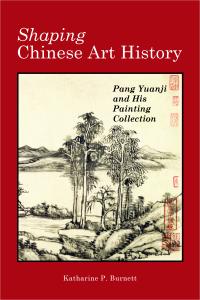Recent UC Davis MEMS Publications
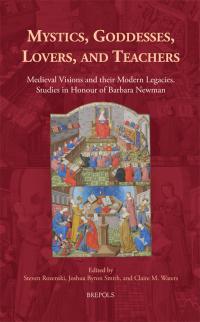
Mystics, Goddesses, Lovers, and Teachers: Medieval Visions and their Modern Legacies
Edited by Claire Waters, Steven Rozenski, and Joshua Byron Smith
The conjunction of medieval religious studies and gender studies in the past several decades has produced not only nuanced attention to medieval mystics and religious thinkers, but a transformation in the study of medieval culture more broadly. This volume showcases new investigations of mysticism and religious writing in the Middle Ages and the early modern period. It also presents groundbreaking explorations of the feminized divine, from medieval to modern, and the many debts of medieval secular texts and cultures to the religious world that surrounded them. Medieval crossover also defines this volume: the contributors examine the crossovers between male and female, cloister and saeculum, divine and human, and vernacular and Latin that characterized so much of the complexity of medieval literary culture. These collected chapters examine mystics from Hildegard of Bingen and Juliana of Cornillon to Richard Rolle, Julian of Norwich, and Tomás de Jesús; the modern theologies of Philip K. Dick and Charles Williams; goddesses like Fame, Dame Courtesy, and Mother Church; and the role of religious belief in shaping conceptions of pacifism, obscenity, authorship, and bodily integrity. Together, they show the extraordinary impact of Barbara Newman’s scholarship across a range of fields and some of the new areas of investigation opened by her work.
UC Davis Library Link | Buy Online
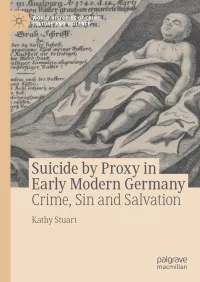
Suicide by Proxy in Early Modern Germany: Crime, Sin, and Salvation
by Kathy Stuart
Suicide by Proxy became a major societal problem after 1650. Suicidal people committed capital crimes with the explicit goal of “earning” their executions, as a short-cut to their salvation. Desiring to die repentantly at the hands of divinely-instituted government, perpetrators hoped to escape eternal damnation that befell direct suicides. Kathy Stuart shows how this crime emerged as an unintended consequence of aggressive social disciplining campaigns by confessional states. Paradoxically, suicide by proxy exposed the limits of early modern state power, as governments struggled unsuccessfully to suppress the tactic. Some perpetrators committed arson or blasphemy, or confessed to long-past crimes, usually infanticide, or bestiality. Most frequently, however, they murdered young children, believing that their innocent victims would also enter paradise. The crime had cross-confessional appeal, as illustrated in case studies of Lutheran Hamburg and Catholic Vienna.
UC Davis Library Link | Buy Online
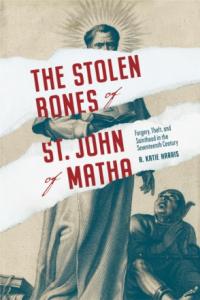
The Stolen Bones of St. John of Matha
by A. Katie Harris
On the night of March 18, 1655, two Spanish friars broke into a church to steal the bones of the founder of their religious institution, the Order of the Most Holy Trinity. This book investigates this little-known incident of relic theft and the lengthy legal case that followed, together with the larger questions that surround the remains of saints in seventeenth-century Catholic Europe.
Drawing on a wealth of manuscript and print sources from the era, A. Katie Harris uses the case of St. John of Matha’s stolen remains to explore the roles played by saints’ relics, the anxieties invested in them, their cultural meanings, and the changing modes of thought with which early modern Catholics approached them. While in theory a relic’s authenticity and identity might be proved by supernatural evidence, in practice early modern Church authorities often reached for proofs grounded in the material, human world—preferences that were representative of the standardizing and streamlining of sixteenth- and seventeenth-century saint-making. Harris examines how Matha’s advocates deployed material and documentary proofs, locating them within a framework of Scholastic concepts of individuation, identity, change, and persistence, and applying moral certainty to accommodate the inherent uncertainty of human evidence and relic knowledge.
Engaging and accessible, The Stolen Bones of St. John of Matha raises an array of important questions surrounding relic identity and authenticity in seventeenth-century Europe. It will be of interest to students, scholars, and casual readers interested in European history, religious history, material culture, and Renaissance studies.
UC Davis Library Link | Buy Online
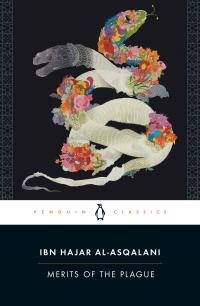
Merits of the Plague
By Ibn Hajar al-Asqalani
Introduction by Joel Blecher and Mairaj Syed
Edited by Joel Blecher and Mairaj Syed
Translated by Joel Blecher and Mairaj Syed
Notes by Joel Blecher and Mairaj Syed
Six hundred years ago, the author of this landmark work of history and religious thought—an esteemed judge, poet, and scholar in Cairo—survived the bubonic plague, which took the lives of three of his children, not to mention tens of millions of others throughout the medieval world. Holding up an eerie mirror to our own time, he reflects on the origins of plagues—from those of the Prophet Muhammad’s era to the Black Death of his own—and what it means that such catastrophes could have been willed by God, while also chronicling the fear, isolation, scapegoating, economic tumult, political failures, and crises of faith that he lived through. But in considering the meaning of suffering and mass death, he also offers a message of radical hope. Weaving together accounts of evil jinn, religious stories, medical manuals, death-count registers, poetry, and the author’s personal anecdotes, Merits of the Plague is a profound reminder that with tragedy comes one of the noblest expressions of our humanity: the practice of compassion, patience, and care for those around us.
UC Davis Library Link | Buy Online
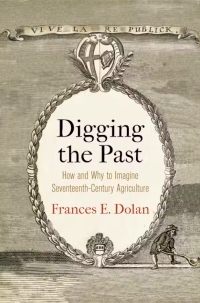
Digging the Past
We are today grappling with the consequences of disastrous changes in our farming and food systems. While the problems we face have reached a crisis point, their roots are deep. Even in the seventeenth century, Frances E. Dolan contends, some writers and thinkers voiced their reservations, both moral and environmental, about a philosophy of improvement that rationalized massive changes in land use, farming methods, and food production. Despite these reservations, the seventeenth century was a watershed in the formation of practices that would lead toward the industrialization of agriculture. But it was also a period of robust and inventive experimentation in what we now think of as alternative agriculture. This book approaches the seventeenth century, in its failed proposals and successful ventures, as a resource for imagining the future of agriculture in fruitful ways. It invites both specialists and non-specialists to see and appreciate the period from the ground up.
Building on and connecting histories of food and work, literary criticism of the pastoral and georgic, histories of elite and vernacular science, and histories of reading and writing practices, among other areas of inquiry, Digging the Past offers fine-grained case studies of projects heralded as innovations both in the seventeenth century and in our own time: composting and soil amendment, local food, natural wine, and hedgerows. Dolan analyzes the stories seventeenth-century writers told one another in letters, diaries, and notebooks, in huge botanical catalogs and flimsy pamphlets, in plays, poems, and how-to guides, in adages and epics. She digs deeply to assess precisely how and with what effect key terms, figurations, and stories galvanized early modern imaginations and reappear, often unrecognized, on the websites and in the tour scripts of farms and vineyards today.
UC Davis Library Link | Buy Online
In this book, Tobias Menely develops a materialist ecocriticism, tracking the imprint of the planetary across a long literary history of poetic rewritings and critical readings which continually engage with the climate as a condition of human world making. Menely’s central archive is English poetry written between John Milton’s Paradise Lost (1667) and Charlotte Smith’s “Beachy Head” (1807)—a momentous century and a half during which Britain, emerging from a crisis intensified by the Little Ice Age, established the largest empire in world history and instigated the Industrial Revolution. Incorporating new sciences into ancient literary genres, these ambitious poems aspired to encompass what the eighteenth-century author James Thomson called the “system . . . entire.” Thus they offer a unique record of geohistory, Britain’s epochal transition from an agrarian society, buffeted by climate shocks, to a modern coal-powered nation. Climate and the Making of Worlds is a bracing and sophisticated contribution to ecocriticism, the energy humanities, and the prehistory of the Anthropocene.
UC Davis Library Link | Buy Online
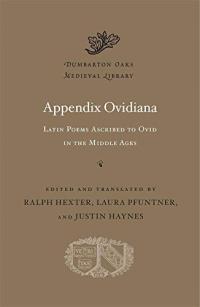
Appendix Ovidiana: Latin Poems Ascribed to Ovid in the Middle Ages
Edited & Trans. Ralph Hexter, Laura Pfuntner, & Justin Haynes
When does imitation of an author morph into masquerade? Although the Roman writer Ovid died in the first century CE, many new Latin poems were ascribed to him from the sixth until the fifteenth century. Like the Appendix Vergiliana, these verses reflect different understandings of an admired Classical poet and expand his legacy throughout the Middle Ages.
The works of the “medieval Ovid” mirror the dazzling variety of their original. The Appendix Ovidiana includes narrative poetry that recounts the adventures of both real and imaginary creatures, erotic poetry that wrestles with powerful desires and sexual violence, and religious poetry that—despite the historical Ovid’s paganism—envisions the birth, death, and resurrection of Christ.
This is the first comprehensive collection and English translation of these pseudonymous medieval Latin poems.
UC Davis Library Link | Buy Online

This Scheming World: Classic Tales of Desire, Deception, and Greed in Old Japan
By: Ihara Saikaku
Trans. by: Masanori Takasuka & David C. Stubbs
Revised by: David J. Gundry
A Great Classic of Japanese literature and the masterpiece of novelist Ihara Saikaku—now in a completely new and revised edition with introduction by noted scholar David J. Gundry
The culmination of Saikaku's perceptive genius, the 20 short stories within This Scheming World recount raucous events and incidents on New Year's Eve as everyone tries to settle their debts for the year, as is the New Year's custom. Crafty money lenders attempt to collect their money from equally crafty debtors, and Saikaku portrays his characters with so lifelike a touch that, even though three centuries have passed since his time, it seems as if they were our contemporaries.
The new Introduction by Saikaku expert David J. Gundry explains how and why this entertaining work still resonates with modern readers today.
UC Davis Library Link | Buy Online
How vagrancy, as legal and imaginative category, shaped the role of policing in colonialism, racial formation, and resource distribution
In this innovative book demonstrating the important role of eighteenth-century literary treatments of policing and vagrancy, Nicolazzo offers a prehistory of police legitimacy in a period that predates the establishment of the modern police force. She argues that narrative, textual, and rhetorical practices shaped not only police and legal activity of the period, but also public conceptions of police power. Her extensive research delves into law and literature on both sides of the Atlantic, tracking the centrality of vagrancy in establishing police power as a form of sovereignty crucial to settler colonialism, slavery, and racial capitalism. The first book in several generations to address policing and vagrancy in the eighteenth century, and the first in the field to center race and empire in its account of literary vagrancy, Nicolazzo’s work is a significant contribution to the field of eighteenth-century literary and cultural studies.
UC Davis Library Link | Buy Online
This study explores how Dante represents violence in the Comedy and reveals the connection between contemporary private and public violence and civic and canon law violations.
Although a number of articles have addressed particular aspects of violence in discrete parts of Dante’s oeuvre, a systematic treatment of violence in the Commedia is lacking. This ambitious overview of violence in Dante’s literary works and his world examines cases of violence in the domestic, communal, and cosmic spheres while taking into account medieval legal approaches to rights and human freedom that resonate with the economy of justice developed in the Commedia. Exploring medieval concerns with violence both in the home and in just war theory, as well as the Christian theology of the Incarnation and Redemption, Brenda Deen Schildgen examines violence in connection to the natural rights theory expounded by canon lawyers beginning in the twelfth century. Partially due to the increased attention to its Greco-Roman cultural legacy, the twelfth-century Renaissance produced a number of startling intellectual developments, including the emergence of codified canon law and a renewed interest in civil law based on Justinian’s sixth-century Corpus juris civilis. Schildgen argues that, in addition to “divine justice,” Dante explores how the human system of justice, as exemplified in both canon and civil law and based on natural law and legal concepts of human freedom, was consistently violated in the society of his era. At the same time, the redemptive violence of the Crucifixion, understood by Dante as the free act of God in choosing the Incarnation and death on the cross, provides the model for self-sacrifice for the communal good. This study, primarily focused on Dante’s representation of his contemporary reality, demonstrates that the punishments and rewards in Dante’s heaven and hell, while ostensibly a staging of his vision of eternal justice, may in fact be a direct appeal to his readers to recognize the crimes that pervade their own world.
UC Davis Library Link | Buy Online

Experimenting with Shakespeare: Games and Play in the Laboratory
By: Gina Bloom, Evan Buswell, Colin Milburn, and Nick Toothman
Excerpt from the book, "this book is, in part, an effort to recount the genesis and development of a game that we, the authors, collaboratively created: the motion-capture Shakespeare game Play the Knave. But more than documenting the history of a specific digital humanities project, the book treats Play the Knave as an index of larger questions about collaboration and the making of postdisciplinary laboratories—or rather, collaboratories. In the spirit of other studies of humanities laboratories and transformative research that conjoins the humanities, arts, and sciences, we address the affordances of exploratory, lab-based collaboration for the curation of humanistic knowledge and the creation of critical media technologies. To this end, the book is also about the formation of the particular collaboratory that gave rise to Play the Knave, namely, the UC Davis ModLab."

The Lithic Imagination from More to Milton
The Lithic Imagination from More to Milton explores how stones, rocks, and the broader
mineral realm play a vital role in early modern England's religious and cultural systems, a role that, in turn, informs the period's poetic and visual imagination. The scale of the human lifespan and the gyre-like turns of England's long Reformation provide a conceptual framework for the various stony textual and visual archives this book studies. The texts and images participate in specifically English histories (literary, artistic, political, religious) although Continental influences are frequently in dialogue. The religious orbit encompasses the Christian rivalry with Jewish culture, touches on Christianity's tension with Islam, but most intently centers on the antagonism between Catholic and variants of Protestant and Reformed belief.
The volume features canonical writers such as Shakespeare, Spenser, Donne, Wroth, Herbert, Milton, and Pulter, but puts them in company with lesser-known religious polemicists, alchemists, anatomists, painters, mothers, and stonemasons. Accordingly, the multimedia archive includes drama, lyric, and prose as well as biblical illustrations, tapestries, church furniture, paintings, anatomical drawings, and statues. The lithic too is capaciously construed as a continuum of rocky as well as mineral forms ranging from bodily encrustations like the kidney and bezoar stone, to salt, iron, limestone, marble, flint, and silicon. The assemblage of materials bears witness to aspirational imperial fantasies and looming colonial conquests; it engages in both syncretism and supersession; upholds and subverts gender hierarchies; limns the race-making category of hue with desire; and supports, and sometimes thwarts, elitist ideologies of an elect, chosen people. All come together via the storied pathways of stone as densely material and as a foundation for the abstract imaginary along the scala naturae. Across the lithic-human fold, stone promises, fascinates, betrays. As alpha and omega, stone can herald salvation or it can threaten with damnation.
UC Davis Library Link | Buy Online
The first book to show how the concept of bodily organs emerged and how ancient tools influenced conceptualizations of human anatomy and its operations.
Medicine is itself a type of technology, involving therapeutic tools and substances, and so one can write the history of medicine as the application of different technologies to the human body. In Tools and the Organism, Colin Webster argues that, throughout antiquity, these tools were crucial to broader theoretical shifts. Notions changed about what type of object a body is, what substances constitute its essential nature, and how its parts interact. By following these changes and taking the question of technology into the heart of Greek and Roman medicine, Webster reveals how the body was first conceptualized as an “organism”—a functional object whose inner parts were tools, or organa, that each completed certain vital tasks. He also shows how different medical tools created different bodies.
Webster’s approach provides both an overarching survey of the ways that technologies impacted notions of corporeality and corporeal behaviors and, at the same time, stays attentive to the specific material details of ancient tools and how they informed assumptions about somatic structures, substances, and inner processes. For example, by turning to developments in water-delivery technologies and pneumatic tools, we see how these changing material realities altered theories of the vascular system and respiration across Classical antiquity. Tools and the Organism makes the compelling case for why telling the history of ancient Greco-Roman medical theories, from the Hippocratics to Galen, should pay close attention to the question of technology.
UC Davis Library Link | Buy Online
Although studies of collectors and collections are on the rise, the collector in China with not only the largest number of high-quality antique paintings but also the most comprehensive and scholarly record of his collection has largely been left unexamined. Pang Yuanji (1864–1949) is that collector, and this book addresses the situation. Analysis of Pang’s collection reveals not only his personal taste but also how his taste was an expression of the Qing dynasty canon. As such, Pang’s taste is shown to be standard for the time, and then the standard upheld in new collections abroad. When Pang’s renowned collection became a source for object acquisition by U.S. collectors and museums new to Chinese art (especially Charles Lang Freer and the Freer Gallery), this taste was inevitably absorbed and disseminated through museum exhibitions and scholarly research and teaching. The inadvertent effect of this was that the new field of Chinese art history developed around the Qing canon, a canon that survived well into the latter half of the twentieth century. Knowing about Pang Yuanji and his collection thus helps readers better understand some of the forces at work in shaping Chinese art history today.
This is the first study that takes the innovative and unique approach to collection analysis by quantifying Pang’s collection and comparing it to a selection of contemporaneous private collectors. In doing so, it shows how their tastes and interests were all shaped by the same Qing canon. More broadly, it explains that Pang did not merely absorb this canon, but then also purposefully and systematically used it and his collection to protect China’s traditions into an uncertain future.
Moving from collection analysis to an examination of Pang’s life, the book replaces Pang’s commonplace yet reductionist identity as merchant-collector with a more nuanced understanding of his identity as social transformer. Pang’s role as a modernist with a nationalist agenda becomes evident in the technological advancements and new forms of banking that he brought to his businesses, and the science-based medicine and techniques that he instituted in his hospitals. Through these, his philanthropy and civic leadership, and his renowned collection, he became a respected social and cultural figure in and outside of China. This book thus assesses his impact in his time and on the field of art history. Shaping Chinese Art History: Pang Yuanji and His Painting Collection is an important book for readers of Asian studies, art history, and museum and collections studies, and historiography.
UC Davis Library Link | Buy Online
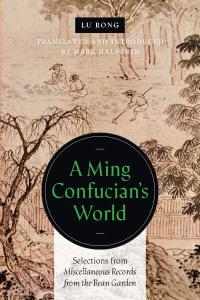
A Ming Confucian's World: Selections from Miscellaneous Records from the Bean Garden
By: Lu Rong
Trans. by: Mark Halperin
A forgotten century marks the years between the Ming dynasty's (1368–1644) turbulent founding and its sixteenth-century age of exploration and economic transformation. In this period of social stability, retired scholar-official Lu Rong chronicled his observations of Chinese society in Miscellaneous Records from the Bean Garden (Shuyuan zaji). Openly expressing his admirations and frustrations, Lu provides a window into the quotidian that sets Bean Garden apart from other works of the biji genre of "informal notes."
Mark Halperin organizes a translated selection of Lu's records to create a panorama of Ming life. A man of unusual curiosity, Lu describes multiple social classes, ethnicities, and locales in his accounts of political intrigues, farming techniques, religious practices, etiquette, crime, and family life. Centuries after their composition, Lu's words continue to provide a richly textured portrait of China on the cusp of the early modern era.
